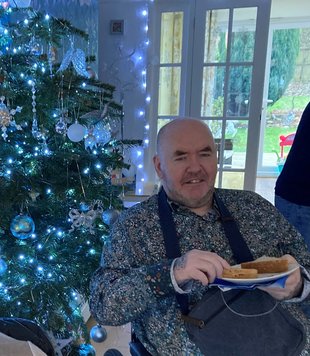When John Hatchman was diagnosed with a rare neurological disorder, three days before turning 50, life turned upside down for the whole family. But the personalised care he and his wife Trudy received from the community hospice over the two years before John sadly died in August 2022 made an incredible difference at a very difficult time. Here Trudy explains why she’s so committed to supporting the hospice to enable others to receive this life-changing care.
John Hatchman loved his family, his job, his friends and doing his bit for the local community. He had a ready smile, warm nature and a wicked sense of humour which he retained right until the end of his life.
John, who lived in Kent with his wife of 30 years Trudy and son Jonny, was a very sociable person whose calendar was always packed. “Everyone loved John,” Trudy recalls fondly. “We were always out with friends, always had a holiday or concert coming up. We had so many plans.”
Following a suspected stroke, John went on to be diagnosed in February 2016 with a rare and progressive neurological disorder, Corticobasal Degeneration (CBD). It can cause problems with speech, movement, swallowing and memory – but that didn’t prevent John from celebrating his milestone 50th birthday just three days later.
And CBD also wouldn’t stop John and Trudy from achieving long-held travel dreams either – but they couldn’t have done so without the incredible support and bespoke care delivered by the community hospice team.
“From the first day we were referred to the hospice they were amazing,” Trudy explains. “They helped us with everything; providing equipment and making adjustments at home to make John comfortable, assisting when John needed to be fed by PEG tube feeding, helping with financial advice when John had to give up work and crucially bringing John’s pain management under control – without which I don’t think he’d have lived as long as he did.
“The Community Hospice led on the communication with all the other teams involved in John’s care. Thanks to them it worked like clockwork.
"We didn’t want to look back and think we hadn’t experienced everything we could and along the way the hospice was there, supporting us to achieve this."
“We didn’t want to let John’s condition limit us, so every three months we tried to take a trip. We went to Greece, Iceland, Morocco, Rome, Cornwall, Bath, Edinburgh and the Lake District. We even went to Sorrento for my 50th birthday.
“At one point John was on an oxygen cannister and PEG feeding but that didn’t stop us. We didn’t want to look back and think we hadn’t experienced everything we could and along the way the hospice was there, supporting us to achieve this.”
Trudy says the help and advice she personally received from the hospice team was also transformative.
“They were a brilliant support and I stay in touch with some of the nurses. There were times I really worried I was doing the right thing for John but I knew I could call them 24/7 and they were so kind.
“If we needed it, a community nurse would come out to us at home, and they also organised some extra carer hours to help me. Twice John was admitted to the IPU to get his medication and pain levels under control, and it gave me a respite break.
“Even when we knew John was going to die a lovely nurse Lisa came out to see us and helped me move his bed so I could more easily manoeuvre around him. All these things made such a big difference to us. Neither John or I could have received better care.”
"The hospice listened to what mattered to us as a family."
It was John’s wish to die at home, and when the time came the hospice was once again there to help with whatever he and his family needed.
“John had so much care from the community nursing team,” Trudy says. “I can’t imagine how we would have coped without them. At the end, John was not in pain and was able to die in his own home, as he wanted. The hospice listened to what mattered to us as a family.
“After he’d passed away they continued to help with advice about contacting the funeral directors. They even asked if they could help with taking all the medication away.”
Trudy says her advice for anyone who may be at the start of their hospice journey is to be open to all it can offer you and your loved ones.
